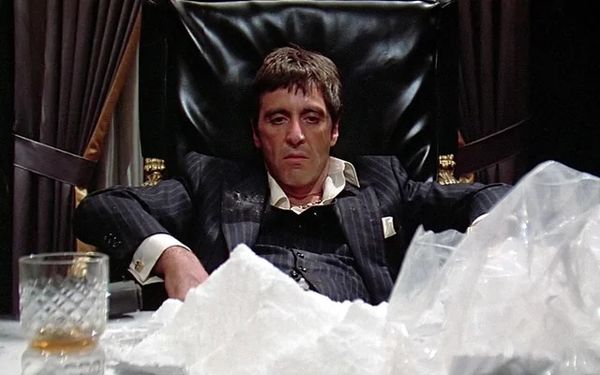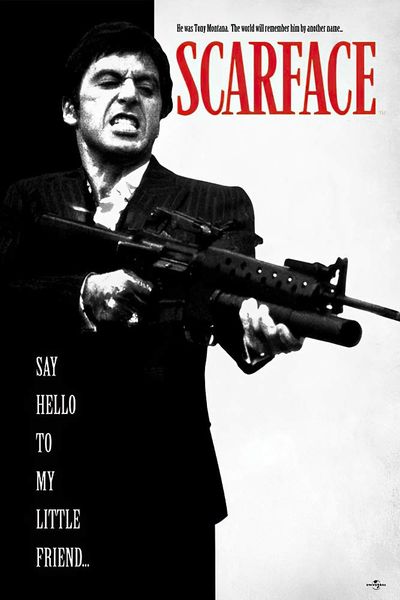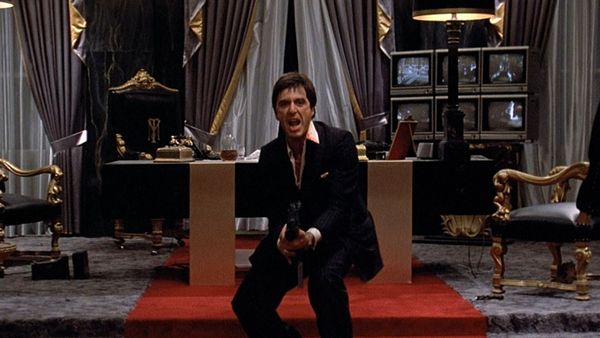Scarface (1983)

Scarface is a landmark crime film that has become a defining work in the genre, known for its intense performances, gritty storytelling, and iconic status. Released in 1983 and directed by Brian De Palma, the film stars Al Pacino as Tony Montana, a Cuban immigrant who rises to power in the Miami drug trade. With a screenplay by Oliver Stone, Scarface explores themes of ambition, greed, and the American Dream, all set against a backdrop of violence and excess.
The story follows Tony Montana’s journey from a lowly immigrant to a powerful drug lord. Arriving in the U.S. during the Mariel boatlift, Tony is determined to escape poverty and make a name for himself. He quickly becomes involved in the cocaine trade, working for a powerful drug lord, Frank Lopez (Robert Loggia). As Tony rises through the ranks, his ruthless ambition and paranoia lead to his eventual downfall.

Al Pacino’s portrayal of Tony Montana is both charismatic and menacing. Pacino delivers a performance filled with intensity and complexity, capturing the character’s fierce determination and eventual moral decay. Tony is a larger-than-life figure whose violent tendencies and insatiable appetite for power propel him into a world of excess. His iconic line, “Say hello to my little friend!” has become part of cinematic lore, encapsulating the film’s blend of bravado and brutality.

The film is characterized by its stylistic approach, with De Palma employing striking visuals and dynamic camerawork. The use of slow-motion, dramatic lighting, and elaborate set pieces enhances the film’s sense of drama and heightens its violent confrontations. The cinematography captures both the opulence and the darkness of Tony’s world, effectively reflecting his internal struggles and the consequences of his choices.

Scarface also features memorable performances from a strong supporting cast, including Michelle Pfeiffer as Elvira Hancock, Tony’s love interest, and Steven Bauer as Manny Ribera, Tony’s right-hand man. Elvira’s character provides insight into the personal costs of Tony’s ambitions, as she grapples with the consequences of his lifestyle. The dynamics between the characters add layers to the narrative, illustrating the complexities of loyalty and betrayal in a world driven by greed.

The film’s score, composed by Giorgio Moroder, contributes to its memorable atmosphere. The music blends synth-driven tracks with traditional Latin influences, creating a soundscape that complements the film’s themes of desire and danger.
While Scarface received mixed reviews upon its release, it has since garnered a significant cult following and is often regarded as one of the greatest gangster films of all time. Its exploration of the American Dream, replete with the pitfalls of ambition and excess, resonates with audiences, making it a timeless commentary on the consequences of unchecked desire.
In conclusion, Scarface is a powerful and stylized examination of ambition, power, and the darker aspects of the American Dream. Al Pacino’s unforgettable performance as Tony Montana, combined with Brian De Palma’s masterful direction and Oliver Stone’s sharp screenplay, creates a film that is both compelling and provocative. Through its exploration of violence, loyalty, and moral ambiguity, Scarface remains an iconic entry in the crime genre, continuing to captivate and challenge audiences with its raw portrayal of the pursuit of power and the cost of success.











